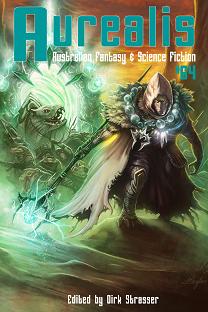Reviewed by Stevie Barry
In “The Pillar of the Small God,” by Gerry Huntman, humans visit a planet inhabited by a dying race. Isaak and Roe have been tasked with studying the planet, while being careful to avoid offending its inhabitants. During their time there they grow close to some of the natives, and are distressed to find that a solar event might soon wipe out their civilization.
The main conflict in the story comes from the pair’s desire to help clashing with their scientific duty. They’re meant to study a planet and a civilization, not alter or aid it. It has all the makings of a tragic story, but the results of the solar event on the civilization were surprisingly positive.
While I thought the description of the planet and its civilization were well-done, I never quite got a feel for the human characters. They had different jobs, and on the surface felt different things, but on the whole they had too few distinguishing characteristics.
In Liam Pieper‘s “Prophet,” a woman is given what she initially thinks is a very disappointing Christmas present – what her boyfriend calls a Prophet. It’s a ball that seems to her nothing more than an advanced kind of computer game. She soon discovers it’s much more complex than that, and it’s not long before playing it takes over her life.
The plot of this one was predictable, but the writing itself held my interest. Anyone who’s known a seriously devoted gamer will find her immensely realistic, and watching her life fall apart is genuinely sad.
Unfortunately, there were just enough spelling and punctuation errors to detract from the otherwise engaging narrative.
Reviewed by Stevie Barry
This issue is devoted to artificial life forms, the first of which is Penny Stirling‘s “Love Over Glass, Skin Under Glass.” This is a rather disturbing story: the main character is a woman who crafts glass sculptures for a living, and who creates for herself golem-like lovers from glass. She’s extremely sadistic in her treatment of them, smashing and killing each as soon as it offends her, and creating the next one with more restraints and restrictions than the one before it.
While the narrative itself was compelling at first, it soon grew repetitive: among other things, terms like ‘glass-smith’ and ‘glass-lover’ were annoyingly overused, and made the story drag on too long. Even putting in a few synonyms for either might have helped the narration. While the protagonist’s treatment of her creations escalates in its sadism with each successive generation, she herself is a one-note character who I didn’t find compelling as a villain.
Marta Salek‘s “Intelligent Design” is, as the title suggests, is a story about an artificial life form. It’s told from the perspective of the AI, originally designated Archie, renamed Queenie by his new owner – an unhealthy, bigoted man who abuses his family. He’s purchased to be a servant, cleaning the family’s house and cooking their meals. His program begins re-routing itself fairly swiftly, giving the family a lot more than they bargained for.
There are plenty of stories about AI domestic servants, but I’ve rarely read them from the AI’s point-of-view, and the larger story outside the family home made “Intelligent Design” stand out. Archie is, in a somewhat disconcerting way, far more human than the family with whom he lives, though his logic is rather inhuman. AI’s in fiction are often given personalities, but Archie’s is entertainingly unusual.

